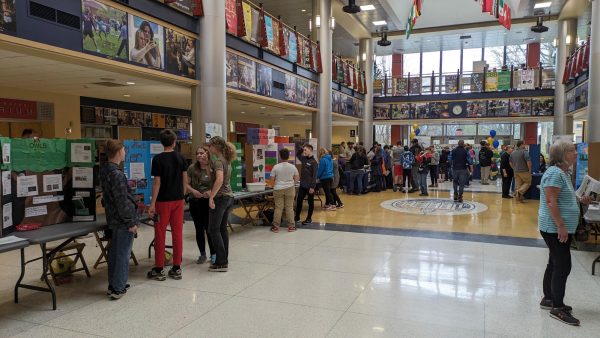Grounds for Change drops the mic
Allegheny College’s student-run, non-profit coffee shop, Grounds For Change, hosted its first open mic night of the semester on Saturday, Feb. 13, and I dearly hope that nothing about that sentence surprised you. GFC open mic nights are fairly routine. What set this particular one above the rest—what makes it worth this 1,000-odd word article—were two stories involving childhood animal-killing.
Included were instrumentation quotidian for any coffeeshop open mic night: six guitar acts (two of them electric, the other four acoustic), two ukuleles, one acapella, two pianos and two spoken-word poetry reading. The two tales of faunacide came at the end of stand-up comedy routines, and both were, surprisingly, quite well-received.
Looking around the room, the sheer volume of flannel shirts and Bernie 2016 paraphernalia would lead one to assume that a good fraction of GFC patrons are vegans or at least vegetarian, i.e. the kind of people ideologically opposed to even the harm of animals.
Knowing a few of these men and women personally, I can assure you that this is not mere conjecture. Nor is it indictment: the jokes, I have to admit, were psychologically hilarious.
For the most part, the setting was dim, though light pollution from the campus center’s second floor threatened to ruin the atmosphere. Darkness existed in pockets, and these were for the most part occupied by patrons inexplicably doing their homework during a live music show.
The anterior section of the house was more attuned to the shows. But there is something to be said for the homework crowd: getting any work done during this kind of event must be 98 percent meditative calmness and 2 percent getting dragged into the moment by jarring, punctuated explosions of applause.
And said applause is not the thunderous product of a vast stadium, but a snappish gale produced by a tight pocket of close friends (and other performers anxiously waiting their turn). And I should note that the smacking of hands and shrill cheering up close produce an awfully obnoxious effect on the senses. Hence my utter amazement that anyone can write so much as a sentence at one of these events.
The night opened with Luis McUmber, ’19, performing a piano-and-voice rendition of “Let It Be,” a curiously climactic song for the beginning of the night, though this was followed by an electric-guitar (though vocal-less) performance of “Supermassive Black Hole” by Muse.
Menachem Lattke, ’18, followed up with the first stand-up routine of the night. Lattke told me, before he went on, that he had originally planned to play a punk-rock set with a friend, but their lack of a percussionist precluded this performance. His “story,” as he referred to it, was completely unscripted and unrehearsed.
Lattke related how he once found an injured bird and attempted to nurse it back to health. He had, according to his story, attempted to collect bird eggs from nests and hatch them as a child; now, here was his chance with a living adult. But the bird came to an unfortunate end: while searching frantically for it in his house one day, Lattke accidentally squashed it between a sewing machine and a wall.
“And it made me realize, I was not fit to be a mother of anything,” said Lattke. “I killed a lot of birds before they were born. And another one after. And that’s probably why I don’t like birds.”
Following Lattke was a ukulele performance; following this, Morgan Boyd, ’19, read aloud a personally-written poem. Thematically, it offered a kind of introspection that the audience could readily access, as poems are wont to do.
“I was taught to be a tough cookie,” said Boyd, “but maybe the recipe has grown stale.”
There is certainly something to be said for performing your own writing live. Every word only lasts once, and every syllable and sentence exists at the mercy of your tenor. If an audience member misses a line, there is no reclaiming it, no asking the speaker to repeat herself. (This is a far stretch from this article, where if you get bored and glaze over a sentence, you can just go back and reread it. Which I totally will not take offense for. You probably have Facebook open behind this paper, don’t you?)
As a performer, your words are themselves informed by your voice, posture, pacing and timbre—things that you, dear reader, are inventing extemporaneously for these written words of mine. Such is the price that I pay for writing in an immortalizing medium: I am immortalized in anonymity. These coffee-shop performances exist for a moment; they spark and fade, but that spark has the potential to be an explosion of everything that is the author.
Theresa Buczek, ’17, offered her own written words to the tune of an acoustic guitar. She opened her set with a commemorative Valentine’s Day satire-ballad titled, “Single Awareness Day.”
The chorus ran, “Happy Singles Awareness Day, where single people pretend they’re OK.”
By the third iteration of the chorus, Buczek, like her predecessors that night, turned the humor on herself and changed the line “single people” to “I” and “they’re” to “I’m.”
Also apposite to the occasion of the weekend,Bolan Marshall-Hallmark, ’17, and Megan Greig, ’18 played a duet version of “Like I’m Gonna Lose You” by Meghan Trainor. Audrey Trotta, ’18, sang “Cough Syrup” by Young The Giant along with Alana Picozzi, ’18. Trotta went solo for a while, and was then joined onstage by Trey Durst, ’16, for “Northern Downpour” by Panic! At The Disco.
But the show was clearly wrapped up and walked, under arm, straight past security by Daniel Wightkin, ’16, who put up a ferociously self-deprecating comedy sketch. The routine began fairly innocuously and ended with howled laughter in response to a story of finding a pet hamster with half its face ripped off.
“I try to write [my jokes] about how I feel about things, which is why I write about nothing,” Wightkin said. “People often come up to me after a show and ask, ‘Danny, why are you so sad?’ And I say, ‘I’m not sad, I’m depressed.’”
After the laughter died down, Sean Gannon, ’16, approached the stage wearing headgear that can only be described as rudimentary deer antlers protruding from a red bundle of ribbons.
“I’m sure you can tell by my outfit that I’m going to play some prog rock,” Gannon said.
Gannon’s weapon of choice was the 12-string guitar; he was the eighth or ninth performer of the night, and yet he was the first who used chords not recognizable as simply major or minor.
The last official performance of the night went to Hope Sims-Medley, ’18, who played “Zombie” by the Cranberries and “Read All About It” by Emeli Sandi in homage to Black History Month. Friends and fans cheered, patrons exited stage right, and the moment of artistic solidarity, self-deprecation and animal-cruelty-humor, the moment that had lasted more than two hours, faded.






